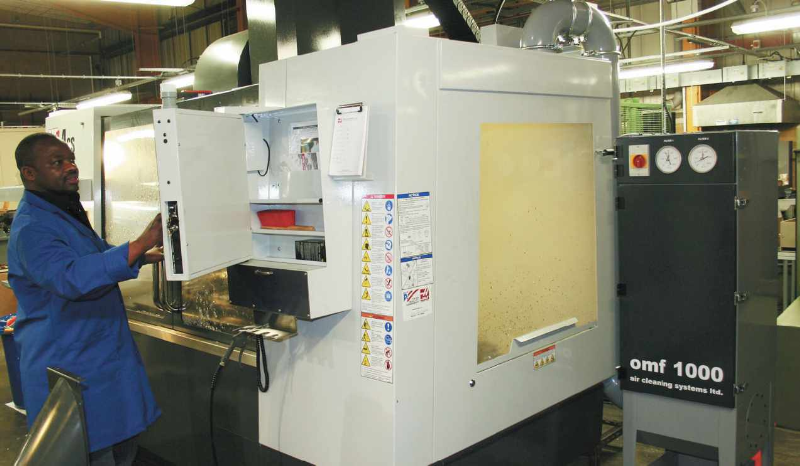 Manufacturer of communication devices and transmitters TMD Technologies has installed a number of media filtration units from
Manufacturer of communication devices and transmitters TMD Technologies has installed a number of media filtration units from
Air Cleaning Systems to deal with a build up of oily film which was putting sensitive test equipment at risk in its open plan facility
The Hayes based manufacturer had purchased a Haas VF4 and two VF2 machining centres to increase productivity and R&D work in its machine shop. But this created an issue for TMD, as its nearby test rigs that work to extreme accuracy levels were providing inconsistent results and deviations that were caused by airborne oil mist affecting the electronic equipment. As a manufacturer of microwave tubes, high voltage power supplies and transmitters for radar, EW, communications and other laboratory applications, cleanliness is a pre-requisite that was compromised by the airborne particulate from the machine tools.
As production machine shop manager, Dave Casey recalls: “Within a matter of weeks of installing the Haas machining centres, we witnessed an oil film in the workshop and adjacent test area. This film resulted in a technician receiving an electric shock when testing high voltage test gear.
Additionally, we started to receive concerns from the test area regarding the deviating tolerances as a result of the mist. We immediately investigated the marketplace and found ACS was capable of providing the solution with its OMF1000 media filtration units.”
The test facility rigorously tests radar equipment by measuring microwave beams passed through tube assemblies. With each assembly valued at well beyond £50,000, failure and rejects are not an option for the company. The situation resulted in the ACS units being installed; a matter of weeks after TMD approached ACS.
 The new OMF1000 media filtration units now extract the oil mist at source to ensure the immediate environment is oil and mist free. As Casey continues: “ACS understood the urgency of our predicament and worked rapidly and efficiently with impeccable service to resolve our problems. Since the installation of the units there has been no airborne particulate, so our testing department is safe and operating its test rigs with no tolerance deviations caused by oil mist.”
The new OMF1000 media filtration units now extract the oil mist at source to ensure the immediate environment is oil and mist free. As Casey continues: “ACS understood the urgency of our predicament and worked rapidly and efficiently with impeccable service to resolve our problems. Since the installation of the units there has been no airborne particulate, so our testing department is safe and operating its test rigs with no tolerance deviations caused by oil mist.”
As a company that has won two Queens Awards, one for innovation and another for International Trade, TMD supplies customers such as Raytheon, Samsung, Thales, Alcatel, BAE Systems, NEC, Northrop Grumman, Toshiba and the world’s military forces. The company places multi-million pound orders from high-profile customers including the world’s armed forces with key decision makers regularly visiting the Hayes site to inspect the manufacturing facility. From this perspective, the company is keen to maintain an impeccably clean image, so oil mist that leaves a dirty film on the machines, floor, work surfaces and virtually any other surface in the nearby vicinity is unacceptable.
Components produced in the machine shop include metal boxes for power supplies and development work on new product ranges. This results in anything from one off components to batches of 200 in a range of materials including stainless steel, aluminium and copper. With such a work flow, the machine doors are opened to remove and re-set a new part after each cycle. The elimination of mist enables the operator to immediately load a new part after the cycle has finished as opposed to previously waiting for the mist to dissipate prior to re-loading the machines. This has created a productivity benefit for TMD; it now saves upwards of a minute for each batch component that it machines.
Casey concludes: “The OMF units have resolved the mist issue. This in turn has improved cleanliness, eliminated the safety issue for the test department, returned the test rigs to their high quality standards and tolerances and they have improved the health and productivity of the machine shop.”



